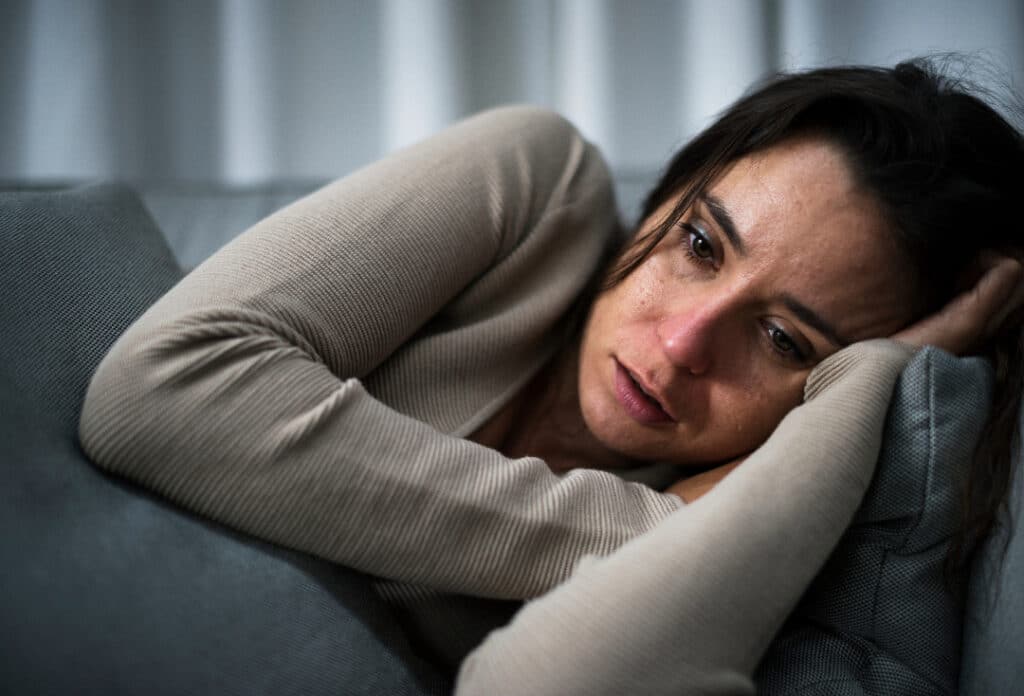It’s difficult enough to suffer from an eating disorder, but what do you do when you suffer from an eating disorder and another mental health disorder? This situation is challenging for anyone, but there is hope and help for successfully treating co-occurring conditions.
Studies show that people suffering from eating disorders are highly likely to suffer from other psychiatric conditions like mood disorders and that depression and eating disorders are this group’s most common comorbidities. Sixty-three percent of people suffering from bulimia nervosa are also diagnosed with major depressive disorder (1).
Relationship Between Depression and Bulimia
Depression and bulimia often occur together because they have many similar features. Sometimes, it’s hard to tell if an individual’s depression causes their disordered eating or if their disordered eating causes their depression. There is no one cause of an eating disorder; however, these two disorders can influence each other, with one worsening the other.
Depression can contribute to the development of bulimia, as individuals may resort to disordered eating behaviors as a way to cope with their depressive symptoms or to gain a sense of control in their life. The negative thoughts and feelings associated with depression, such as hopelessness and worthlessness, can also worsen self-esteem and body image, which are already common factors in the development of bulimia.
On the flip side, the physical and emotional consequences of bulimia, such as changes in weight, malnourishment, guilt, and shame, can contribute to developing or worsening depression. Engaging in disordered eating behaviors and experiencing negative emotions and depressive symptoms can create a vicious cycle, making it challenging for individuals to break free from both conditions (2).
Signs and Symptoms of Co-occurring Depression and Bulimia
Although there are distinct signs of these two mental health disorders, there are overlapping symptoms to be aware of.
Common physical signs of bulimia include the following:
- Tooth decay and gum damage
- Acid reflux
- Russel’s sign: Calluses that form on the knuckles due to skin damage during self-induced vomiting
- Swollen salivary glands
- Gastrointestinal problems: Irregular bowel movements, constipation, diarrhea, or abdominal pain
- Dehydration
- Irregular heartbeat
- Dizziness or fainting
Psychological signs of both depression and bulimia include:
- Shame
- Guilt
- Low self-esteem
- Self-loathing
- Hopelessness
- Worthlessness
- Anxiety
- Self-isolation
Most Common Treatment Options for Depression and Bulimia
If someone suffers from depression and bulimia simultaneously, they are at higher risk for negative consequences and increased risk of suicide. It’s important to treat both conditions at the same time to achieve the best possible results and the best chance of recovery. The following are effective treatments for these disorders:
- Cognitive behavioral therapy
- Dialectical behavior therapy
- Family-based therapy
- Nutrition education
- Medication management
Depending on the severity of your mental and physical health problems, different levels of treatment may be necessary. These can range from outpatient therapy, partial hospitalization treatment programs, residential treatment programs, or inpatient hospitalization for those who are medically unstable (3).
How to Find a Mental Health Professional to Help with Depression and Bulimia
The best thing you can do for your mental health is to talk to a professional. If you’re struggling with depression and bulimia, it’s vital to seek professional help to receive the individualized care needed for recovery. Talk to your healthcare provider and get a referral to a therapist or dietitian specializing in treating eating disorders. Proper treatment can reduce your risk of physical and emotional harm while also achieving long-term recovery.
Resources Available to Help Better Understand Depression and Bulimia
Many resources are available to help you gather valuable information on depression and bulimia. Online resources can provide lists of treatment centers and support groups, and they are great for learning more about eating and mood disorders. These resources can help you and your family stay informed and motivated during your recovery journey. However, it’s important to remember that these resources do not replace professional treatment.
At Toledo Center, our comprehensive, co-occurring disorder treatment programs will help you address your eating disorder and all aspects of your mental health. If you or your loved one is experiencing signs and symptoms of an eating disorder, reach out to our team of professionals by calling 419-885-8800 or using our contact form.
References
- Comorbidities in eating disorders. (2011). Psychiatry and Clinical Psychopharmacology, 21(2).https://psychiatry-psychopharmacology.com/en/comorbidities-in-eating-disorders-132875
- The Bulimia Project. (2023, May 16). Bulimia & co-occurring depression.https://bulimia.com/bulimia-mental-illness/depression/#:~:text=Depression%20and%20bulimia%20nervosa%20also,image%20frequently%20associated%20with%20BN.
- Hurley, K. (2022, September 13). Depression and bulimia. Psycom.https://www.psycom.net/eating-disorders/bulimia/bulimia-and-depression
 Author Bio:
Author Bio:
Kate Delaney Chen, BSN, RN-BC is a healthcare writer and registered nurse with over 17 years of bedside experience. She specializes in Psychiatric Nursing and Nephrology and currently works at a nationally recognized Inpatient Eating Disorders Program.

